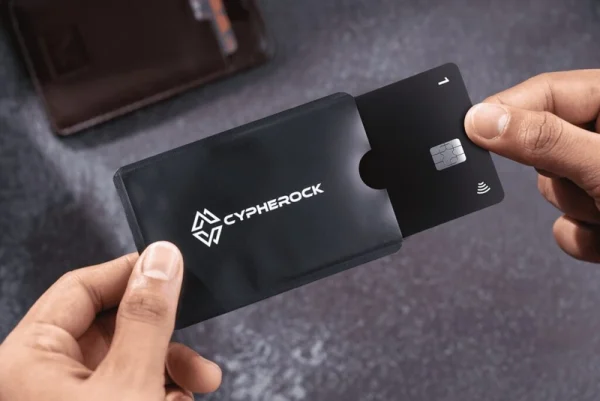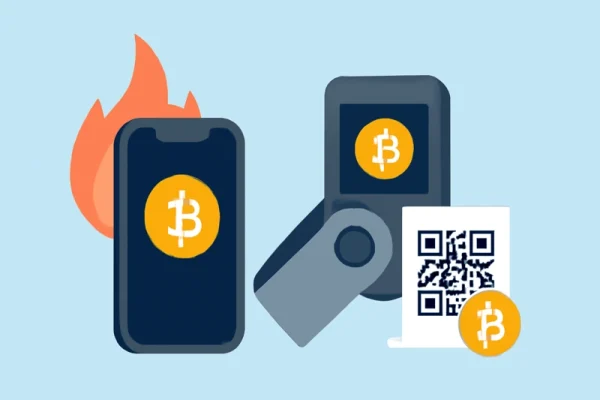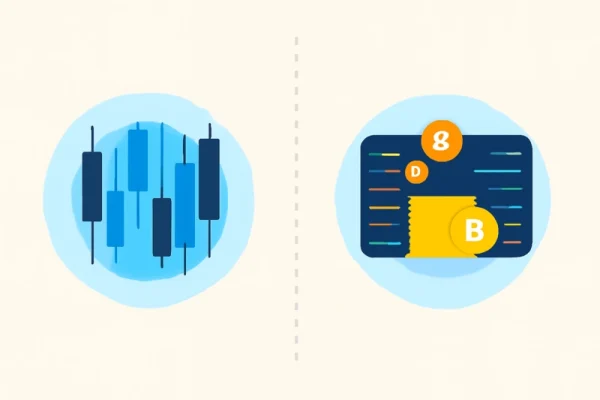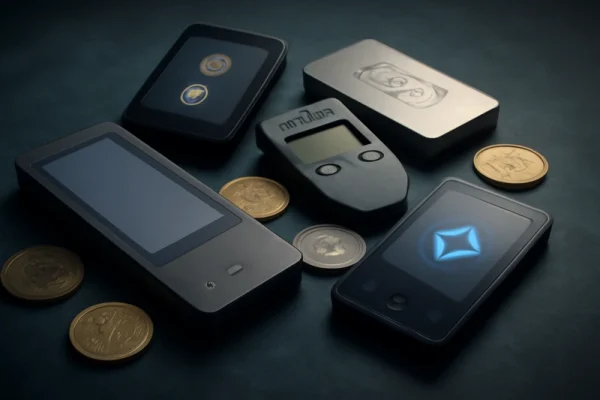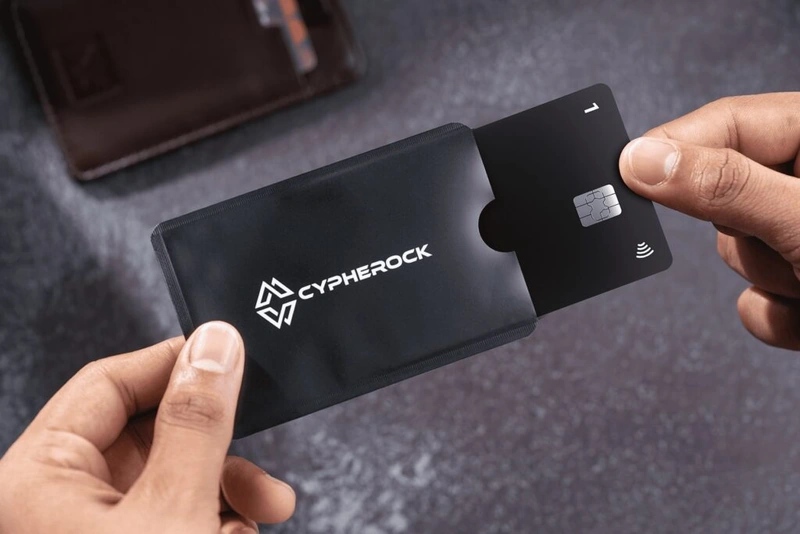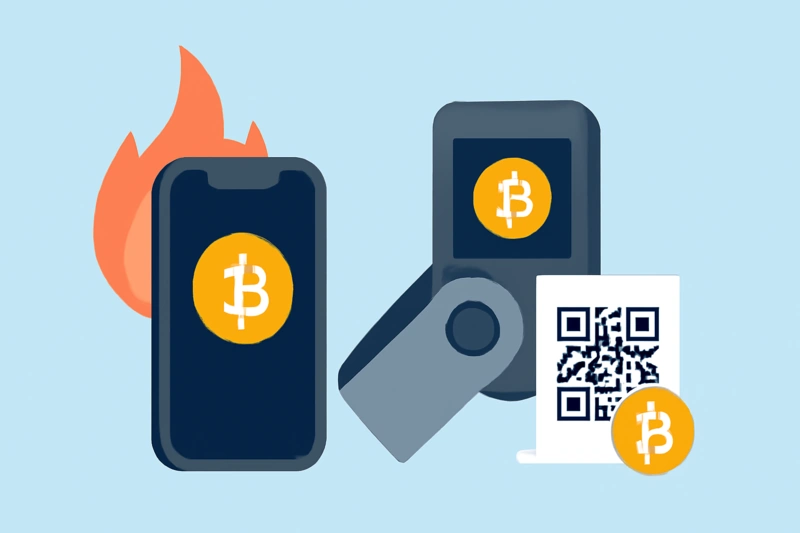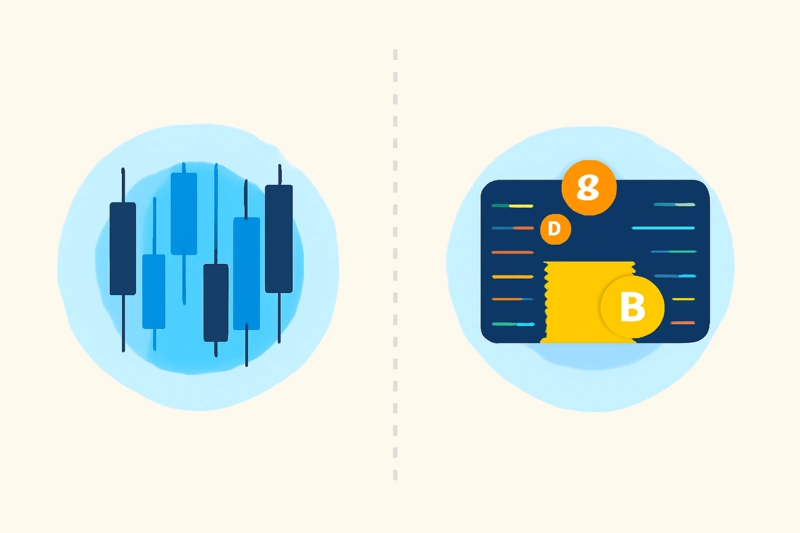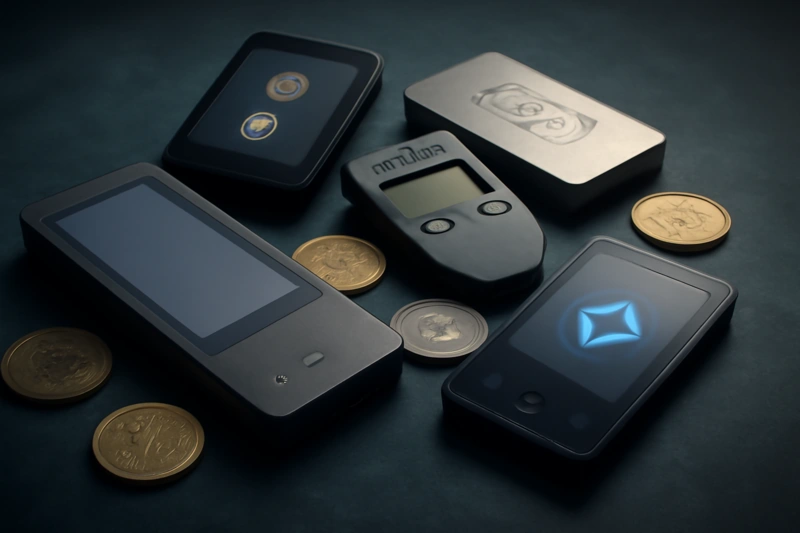Hot Wallet: What It Is, How it Works & Tips
Hot wallet – your high-tech guardian for crypto wealth online. Learn about hot wallets and relevant security tips to protect your crypto assets.
Table of content
Key Highlights:
- Hot wallets (web-based, mobile, and software) prioritize accessibility for daily transactions.
- Used for storing and managing cryptocurrencies online.
- Despite the convenience, they are more vulnerable to online threats.
- Users should ensure strong passwords, enable two-factor authentication if available, and regularly update their hot wallet software.
- Safeguard seed phrase offline for added security.
- The best hot wallet depends on personal preferences; popular options include Coinbase, MetaMask, and Trust Wallet.
What Is a Hot Wallet?
A hot wallet is a cryptocurrency wallet connected to the internet and actively manages the storage and transactions of digital assets. Unlike offline wallets, which provide a more secure storage solution, hot wallets are designed for convenience and accessibility.
As a result, users must prioritize security measures such as two-factor authentication and regular software updates to mitigate potential risks associated with hot wallet usage.
Hot wallets are commonly used for day-to-day transactions, trading, and quick access to funds, making them suitable for individuals and businesses requiring frequent access to cryptocurrency holdings.
How Does a Hot Wallet Work?
A hot wallet creates a digital crypto wallet. It generates a pair of keys: a public one for receiving funds and a private one for transactions. The wallet stays connected to the internet, allowing users to deposit, withdraw, and access cryptocurrencies easily.
While convenient, hot wallets are more susceptible to online threats. Users need to implement security measures like two-factor authentication. The wallet provides real-time updates on holdings and transactions, making it suitable for active cryptocurrency management.
Types of Hot Wallets
Examples of hot wallets include online (web-based), mobile, and software wallets.
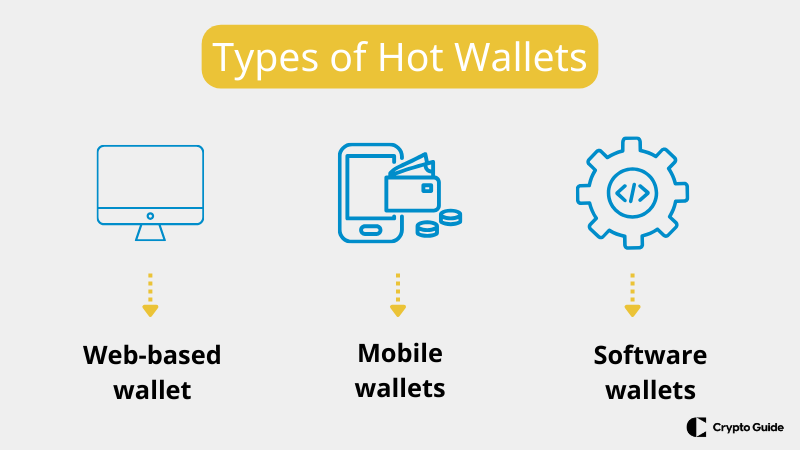
| Type of Hot Wallet | Description |
| Web-based Wallets | Allow users to access funds through a browser. |
| Mobile Wallets | Provide on-the-go convenience through smartphone applications. |
| Software Wallets | Installed on computers, offering a local interface for asset management. |
Note! All these variations share a common feature – they depend on an internet connection to function correctly.
Pros and Cons of Hot Crypto Wallets
| Pros | Cons |
| Convenient for daily transactions | Vulnerable to online hacking and cyber threats |
| Easy to set up and use | Limited control over private keys |
| Real-time access to funds | Potential exposure to exchange or platform risks |
| Supports many various cryptocurrencies | Higher risk for significant amounts of holdings |
| Integration with online services | Relies on internet connectivity |
| Often free or low-cost | Susceptible to phishing attacks |
| User-friendly interfaces | This may involve higher transaction fees |
| Suitable for active trading | Security depends on the chosen wallet and user practices |
Popular Hot Wallets
Let's talk about the most popular hot wallets from the previous years. We share our experience and expert insights and only give our opinions.
Coinbase
Coinbase is one of the most popular hot wallets, widely recognized for its user-friendly interface and comprehensive features. As an online exchange platform, Coinbase provides users with the ability to buy, sell, and store a variety of cryptocurrencies.
With its mobile app and web interface, Coinbase offers convenient access to digital assets and real-time market information. Its commitment to security, regulatory compliance, and ease of use has contributed to its widespread adoption among both beginners and experienced cryptocurrency enthusiasts.
Pros:
- Easy to use for beginners.
- Supports various cryptocurrencies.
- Prioritizes security with features like two-factor authentication.
Cons:
- Limited control over private keys.
- Transaction fees apply.
MetaMask
MetaMask is a popular hot wallet solution for users interacting with decentralized applications (DApps) on the Ethereum blockchain. Operating as a browser extension, MetaMask seamlessly integrates with popular web browsers, enabling users to manage their Ethereum-based assets directly from their browser interface.
Known for its simplicity and compatibility with various Ethereum-based tokens, MetaMask is particularly favored by those engaging in decentralized finance (DeFi) activities and NFT transactions.
Pros:
- Allows direct interaction with decentralized 17,000 web3 dApps.
- Supports a wide range of Ethereum-based tokens.
- Provides control over private keys for enhanced security.
Cons:
- Primarily focused on Ethereum.
- Needs extra learning to use with Dapps.
Trust Wallet
Trust Wallet is a mobile-focused hot wallet for better user privacy and security. Compatible with both iOS and Android devices, Trust Wallet provides users with complete control over their private keys, ensuring a decentralized and secure storage solution.
The wallet supports a range of cryptocurrencies and offers features like in-app swapping and easy recovery options. Trust Wallet's commitment to user autonomy and security measures makes it a popular choice for individuals seeking a mobile hot wallet with better privacy features.
Pros:
- Designed for mobile use.
- Users control their private keys.
- In-app crypto swapping for convenience.
Cons:
- No option to recover wallets via customer support.
- Fees are based on third-party providers.
Some features may be complex for specific users.
Hot Wallet Tips
It's time to talk about hot wallet tips. Implementing these hot wallet tips will help you use your cryptocurrency safely and responsibly, balancing convenience with security considerations.
- Use Only for Transaction: Hot wallets are best suited for active transactions and day-to-day use. Avoid storing large amounts for an extended period; consider cold storage options for long-term holdings.
- Store Your Assets in a Cold Wallet: Consider storing some of your funds in cold wallets when not actively trading or using cryptocurrencies. Cold wallets have robust security measures in place.
- Regularly Update Software: Keep your hot wallet software up to date. Regular updates often include security patches and improvements, reducing the risk of vulnerabilities.
- Enable Two-Factor Authentication (2FA): Enhance your wallet's security by enabling two-factor authentication if available or set a pin for opening the app. This adds an extra layer of protection, requiring a secondary verification step for account access.
- Backup Your Private Key or Seed Phrase: Safeguard your access to funds by creating a backup of your private key and seed phrase. Store these backups securely, preferably in multiple locations, to prevent the risk of losing access.
- Research Before Choosing: Before selecting a hot wallet, conduct thorough research. Consider factors such as security features, supported cryptocurrencies, user interface, and community reviews to make an informed decision.
- Regularly Monitor Account Activity: Stay vigilant by regularly monitoring your hot wallet account activity. Promptly address any unfamiliar transactions or suspicious activity to enhance the overall security of your digital assets.
How Do I Secure My Hot Wallet?
Securing your hot wallet is vital to protect your digital assets. Here's our hot wallets expert guide:
- Strong Passwords
Create a unique password with various characters for your hot wallet app.
- Two-factor authentication (2FA)
Enable 2FA for an additional layer of security during wallet access.
- Regular Software Updates
Keep your wallet software up to date to address potential vulnerabilities.
- Secure Seed Phrase
Safeguard your seed phrase offline and avoid sharing it.
- Backup Your Wallet
Backup wallet data, storing backups securely in multiple locations.
- Use Reputable Wallets
Choose well-reviewed wallets with a proven track record for security.
- Limit Exposure
Keep only a small amount in your hot wallet for daily transactions.
- Monitor Account Activity
Regularly review transaction history for any unauthorized or suspicious activity.
Conclusion About Hot Wallets
In conclusion, knowing about hot wallets is key for anyone using cryptocurrencies. We have more related content if you are interested in finding out what is a crypto wallet or curious about how to choose crypto wallets.
It's important to know that hot wallets make managing your digital coins easy and fast because they connect to the internet. However, this convenience comes with some security risks. As you use these wallets, stay informed and careful. This approach will help you handle your digital assets wisely and enhance your overall cryptocurrency experience.
FAQ About Hot Wallet
Can hot wallets be hacked?
Yes, hot wallets can be vulnerable to hacking due to their continuous internet connection or through your own fault for joining obscure platforms.
Are hot wallets safe?
The safety of hot wallets varies. Implementing strong security measures can enhance their safety.
Which crypto hot wallet is best?
The best hot wallet depends on individual preferences. Popular options include Coinbase, MetaMask, and Trust Wallet.
Is a cold wallet better than a hot wallet?
Cold wallets are generally more secure for long-term storage, while hot wallets offer convenience for daily transactions.
Is Coinbase a hot wallet?
Yes, Coinbase primarily functions as a hot wallet but provides additional security features. Users can opt for cold storage solutions for enhanced security.
